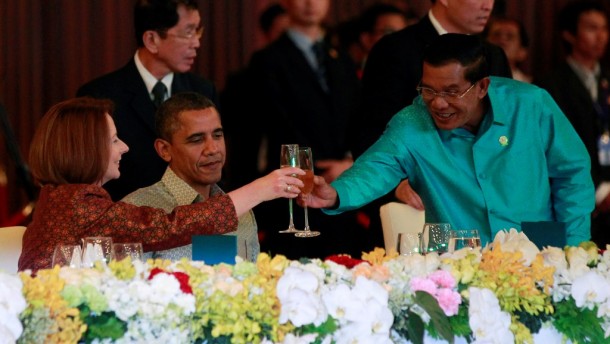WASHINGTON — Human rights activists and US lawmakers are pushing for a cut in the more than $70 million in annual American aid to Cambodia if its Prime Minister Hun Sen extends his 28-year rule in unfair elections this month.
Whether one of Asia’s longest-serving and most ruthless leaders cares much is another matter.
His political strength has only grown since the last election in 2008, and support from a more generous benefactor, China, has grown. That’s fueling fears Hun Sen—no stranger to criticism from Western donors—will ignore calls to ensure the upcoming vote is conducted properly.
The Obama administration has deepened ties with nations across Southeast Asia. It has encouraged the oppressive military regime in nearby Burma to open up, but relations with Cambodia have worsened in recent months. During the first visit by a US president there in November, Barack Obama devoted his entire meeting with Hun Sen to human rights and democracy.
It hasn’t had the desired effect.
In the run-up to the July 28 elections, opposition lawmakers were expelled from parliament for merging parties to contest the vote. Their exiled leader, Sam Rainsy, has been excluded from the election because of his criminal conviction on charges that are widely regarded as being politically motivated.
The State Department has said the exclusion of Rainsy calls into question the legitimacy of Cambodia’s democratic process. There are also doubts over the neutrality of the election commission and the composition of voter rolls.
Lawmakers from both houses of the US Congress are introducing resolutions seeking to reduce aid, particularly direct assistance to the government, if the State Department does not judge the election to “credible and competitive.”
The resolutions also call for Washington to urge international financial institutions that pour hundreds of millions into Cambodian development, such as the Asian Development Bank, to do the same. The Senate resolution is co-sponsored by influential Republicans Marco Rubio and Lindsey Graham, who sits on a powerful appropriations committee that oversees government spending.
Cambodian government spokesmen declined to comment about that prospect. Ruling party lawmaker Chheang Vun told The Associated Press he had no idea what aid the United States gives, “but they did help a lot the opposition party.”
Washington denies taking sides, although Rainsy has taken heart from what he sees as a hardening in the US position.
“The US administration has sent the right message to the Cambodian government, that it won’t be business as usual for Mr. Hun Sen if the next election is not seen to be acceptable. Then Hun Sen will face condemnation and isolation,” he told the AP by phone from his exile in Paris.
But it’s not yet clear what action the Obama administration is prepared to take.
Secretary of State John Kerry is preoccupied with the turbulent Middle East—feeding perceptions that the Obama administration’s “pivot” to Asia is losing steam. With key assistant secretary positions still open, there’s uncertainty about who is running policy toward that region.
Kerry has a long association with Cambodia and Hun Sen. Frank Jannuzi, a former Kerry aide and now with Amnesty International USA, said his former boss ought to call in a favor or two.
During his tenure on the Senate Foreign Relations Committee, Kerry helped persuade Hun Sen to agree to a UN-backed tribunal to try former Khmer Rouge leaders, and also supported US-Cambodia trade—now worth nearly $3 billion a year. He pushed security cooperation on the search for the remains of American servicemen missing from the Vietnam War and the training of a counter-terrorism unit commanded by Hun Sen’s son, who went on to graduate from the US Military Academy.
“Kerry has a personal touch with Hun Sen,” Jannuzi said. “He ought to use it.”
US officials are considering reducing aid, among possible options, though there are differences of opinion over how effective that would be.
Much of the current US aid to Cambodia is for fighting diseases like malaria and HIV/AIDS that afflict the nation’s poorest, or for supporting nongovernmental groups that are probably the most effective check on government abuses, such as land confiscations that have dispossessed tens of thousands of Cambodians.
Concerns over confiscations prompted the World Bank to suspend lending two years ago, yet in large part, Hun Sen has managed to keep international assistance flowing.
In the past decade, Hun Sen has overseen modest economic growth and stability in a country plagued by desperate poverty and nearly destroyed by the genocidal Khmer Rouge rule in the 1970s. And he can look to China for more support. Its loans and grants to Cambodia over the past two decades have totaled about $2.7 billion—compared with $1.2 billion in assistance from the United States over that period. Offshore oil and gas reserves are expected to provide more domestic revenue in coming years.
“What outsiders say about his tactics is of little or no concern to Hun Sen,” said historian David Chandler, a Cambodia expert at Australia’s Monash University. “He knows that there’s not much besides scolding that outside nations are willing or able to do.”
After Hun Sen toppled his co-prime minister in a 1997 coup and consolidated his dominance, Congress did put restrictions on US aid for a decade. But relations have since expanded, including the start of military contacts in 2006, although that assistance is less than $1 million a year.
John Sifton, Asia advocacy director for Human Rights Watch, who will testify at a congressional hearing Tuesday on Cambodia, expressed confidence the United States will cut some aid after the election and said that would be a blow to Hun Sen.
“It’s about legitimacy, not money,” Sifton said.
Associated Press writer Sopheng Cheang in Phnom Penh, Cambodia, contributed to this report.

















